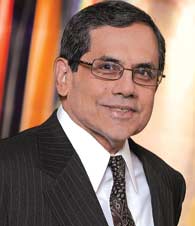|
Executive Interviews: Interview with John C Camillus on Business Model Innovation
May 2009
-
By Dr. Nagendra V Chowdary
 John C Camillus
John C Camillus Donald R. Beall Professor of Strategic Management, Joseph M. Katz Graduate School of Business and College of Business Administration. 
-
What according to you is the best
way for companies to stay focused
during these unprecedented times?
What should they concentrate on?
Two things to bear in mind. First,
each organization should affirm its
identity – the values, aspirations and
competencies that constitute its
distinctive, enduring core. Looking at
problems through the lens of its
identity enables an organization to
make better and consistent strategic
decisions. Second, experience and
some emerging research have led to
the understanding that the criterion of
“humanity” should inform and
guide strategic decisions. The two
dimensions of “humanity” are (1)
humankind and (2) humaneness. In
its first meaning of “humankind”, the
term humanity demands a global
perspective and recognizes the
importance of all economic strata in
the population. In its second
meaning of “humane”, the term
humanity captures the imperative of
being sensitive and responsive to
human needs, whether it is through
the ergonomics of product
manufacture and design, through the
empathy that should inform, for
example, the design of consumer
financial instruments, to the
recognition and response to the
importance of employees as the
source of sustainable competitiveness, customer
satisfaction and economic
performance.
At the University of Pittsburgh, we
have amajor ongoing research project
called the “Business of
HumanitySM” which focuses on
understanding and documenting the
positive and immediate economic
impact of humanity-based decisions
and also seeks to shift the strategy
paradigm to embrace appropriately
these considerations. In this project,
what is unusual is that the arguments
in support of humanity as a key
driver of strategic decisions are being
developed on economic grounds and
not as ethical imperatives or facets of
corporate social responsibility. -
Is there any way to manage the
downturn without downsizing?
The answer is an emphatic “yes.”
Downsizing should be the very last
alternative to consider. If,
unfortunately, it is determined to be
inevitable, there are critically
important guidelines for minimizing
the harm that downsizing can do to
an organization. Downsizing is an
obvious and superficially easy and
attractive response. But I have seen
the deep and long-term damage that
downsizing does to an organization.
Employees should be motivated to
commit their hearts and minds, not
just their time, to the organization’s
success. If the organization has no
loyalty to its employees, why would
they be loyal to the organization?
Competitive advantage is built on
knowledge and knowledge resides in
people. The tacit knowledge that
employees possess is vital to the
organization’s distinctiveness.
Employees who see a future with the
organization can be expected to
participate more effectively in
developing creative alternatives or
sharing the pain of cash shortages. What according to you is a
business model (with elaborate and
differing definitions apart) and what components would constitute a
business model?
A business model is essentially an
entrepreneurial, integrated, high-level
conceptualization of how an
organization intends to employ its
tangible and intangible resources to
create value in products or services
and offer this value attractively and
accessibly to customers or clients. What is the importance of having a
wholesome and holistic
understanding of business models?
Two fundamental reasons. First, a
business model is a precursor to
developing a business strategy where
the details of appropriate technology,
product and service differentiation,
target customer segments,
organizational architecture and
alliances are articulated. The more
‘wholesome’ and distinctive the
business model, the more
competitive and effective the business
strategy will be. Second, the rapidity
with which the business
environment is changing requires
constant evolution and frequent
modification of the business model.
The more “holistic” and systemic the
business model, the more the
avenues for innovation.
|
